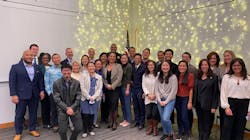MTC hosts roundtable to gauge how safe Asian communities feel about using public transit
The Metropolitan Transportation Commission (MTC) hosted a Federal Transit Administration (FTA)-sponsored roundtable to gauge how safe the Bay Area’s Asian American (AA), Native Hawaiian and Pacific Islander (NHPI) communities feel about using public transit.
The free-form discussion about the communities’ perception of public transportation and about ways transit systems can improve to better serve and meet the communities’ needs led to key takeaways and action items that FTA and local transit agencies can use to improve the AA and NHPI rider experience. The San Francisco event was the second in a series of roundtables around the country conducted as part of the U.S. Department of Transportation’s work to advance equity and justice in AA and NHPI communities and to combat the rise in anti-Asian hate crimes.
Among the potential actions developed by participants:
- Support transit ambassador programs, which provide visible staff presence at stations and on buses and trains. Ambassadors can actively engage riders, provide multilingual assistance, intervene or de-escalate a situation if needed. Support was strong for “aggressively helpful” programs that allow for engagement and not just observation and reporting.
- Increase service frequency, which improves both transit accessibility and a sense of safety for riders who don’t have to endure long waits for the next bus or train.
- Improve seating design that allows for better visual awareness in the system.
Participants discussed the importance of safe, equitable, and accessible transit service to the Bay Area’s AA and NHPI communities, and the critical connections it provides to jobs, healthcare, entertainment and social services. They shared personal and community experiences as targets of anti-Asian hate crimes and harassment, including both verbal and physical assaults, and expressed concern for the safety of AA and NHPI women and seniors.
Local leaders described how incidences of anti-Asian and gender-based harassment in public spaces has sharply increased since the pandemic began. They also acknowledged the challenges and limitations of transit agencies in addressing community-wide issues, like the need for more mental health care, social and other supportive services for unhoused populations. Money is limited, and many transit systems are ineligible for funding programs to address homelessness. Another key challenge discussed is identifying culturally competent solutions to non-criminal behavior on transit and in public spaces.
The leaders of Bay Area Rapid Transit (BART), San Francisco Municipal Transportation Agency and AC Transit shared information about existing programs and resources meant to improve safety and to combat hate crimes and harassment on their systems, including law enforcement and unarmed intervention programs. Specifically, BART’s Deputy Chief for Progressive Policing, Ja'Son Scott, was present and noted the agency’s efforts to seek out conflict resolutions that did not result in arrests, such as bringing unarmed community ambassadors to help direct people in crisis to social supports.
The roundtable emphasized the value of data to better measure and analyze attacks. This includes the importance of riders reporting their safety concerns and any incidents of verbal harassment or physical assault they experience while on transit. These reports help transit agencies deploy their resources more effectively and help prevent future incidents. Participants in the discussion noted many victims are unwilling to report crimes, and those who do often encounter a lengthy and laborious reporting process, which further deters reporting.
The transit agencies also welcomed and received input on ways to improve or expand their programs to better meet the needs of AA and NHPI riders. MTC committed to working closely with federal, state and local agency partners on strategies to fund transit safety improvement projects.
To view a list of participants in the roundtable, click here.
